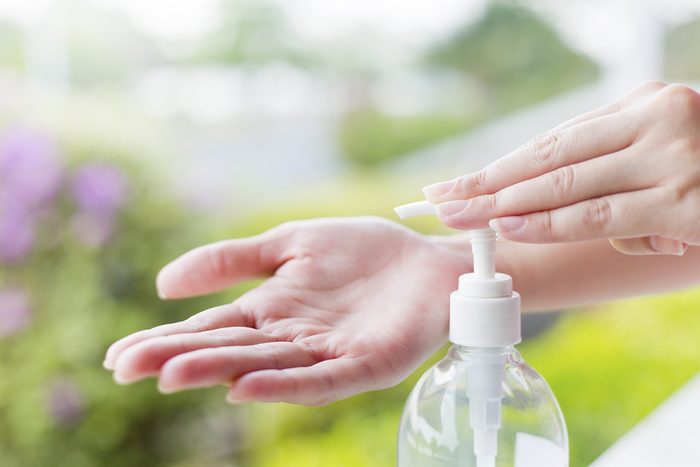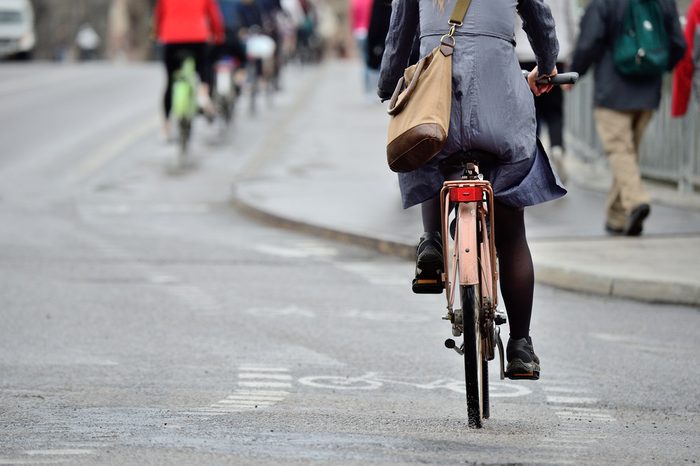
Eco-habit: Ditch disinfectants
You’ve likely heard the call to rid yourself of antibacterial hand soaps that are waiting to wreak havoc on your microbiome, but don’t stop there.
Adria Vasil, an environmental journalist and author of the bestselling Ecoholic series, says that she has found antibacterials on the ingredient lists of toothpastes, deodorants, acne products and dry shampoos.
In the United States, 19 antibacterial ingredients, including triclosan, have been banned by the FDA because there is no evidence that they are safe, but Canada has yet to follow suit. And it isn’t just personal care products, cleaning products also contribute to the problem.
Our oversanitized world is a contributing factor for conditions like asthma, allergies, diabetes and obesity, says Microbiologist B. Brett Finlay, who co-authored the book Let Them Eat Dirt. “We have to respect these microbes and understand that they’re part of us,” he says.
It’s planet-pleasing because…
Just as our bodies thrive on healthy bacteria, so does the environment, says Vasil. Research shows that when all those antibacterial ingredients go down the drain, they affect the fish, plants and other aquatic life downstream. “You don’t want to throw that ecosystem off,” she says.
Environment and Climate Change Canada reports that triclosan, an antibacterial that has received a lot of attention in recent years, is potentially toxic to aquatic life and winds up in fish and stays there. It has also been found to be a hormone disrupter. If you’re still feeling a little germophobic, Vasil recommends wiping surfaces with vinegar, which has natural antibacterial properties.

Eco habit: Get in the bike lane
Over the past few years, there has been a growing concern about our desk jobs and TV-watching lifestyles causing “sitting disease,” which is linked to heart disease and obesity. Technology is making our lifestyles increasingly inactive, but taking a few simple steps (or pedals) to get moving can help.
“It’s so automatic in North America that if we want to go anywhere, even if it’s just a few minutes away, we hop in cars,” says Vasil. “We’d all be healthier if we hopped on bikes instead.”
A 2016 study published in The Lancet Diabetes & Endocrinology found that those who walk or cycle to work have less body fat and a lower body mass index. For women, biking means a 10-pound difference – not a bad incentive to put on a helmet and give up your gas guzzler.
It’s planet-pleasing because…
“If we try to bike to work or to the store instead of hop in a car all the time, we’re not just going to be helping our waistlines; we’re going to be slashing our carbon footprint in a massive way,” says Vasil. About one-quarter of all greenhouse gas emissions in Canada are from cars and other forms of transportation. Reducing even a fraction of our carbon footprint can go a long way. One study found that the carbon emissions from driving a car were more than twice those of taking the bus.

Eco-habit: Don’t sugar coat it
Lately, refined sugar has been getting a bad rap – and for good reason. Not only does the sweet stuff contribute to heart disease, cancer and obesity, but the consumption of sugary drinks may also be linked to an estimated 184,000 adult deaths each year worldwide, according to a review of research published in 2010. Try eating more fruits to satisfy your sweet tooth.
It’s planet-pleasing because…
When Vasil sees people lined up around the block for the latest sugary fad, she has one thing on her mind: The planet. “Sugar cane plantations have led to some of the biggest losses of biodiversity in terms of any single agricultural product,” explains Vasil. Translation: Our homes, plants and animals all take a hit. When you have a hankering for sweets, Vasil says to look for organic and fair-trade sugar and consider local maple syrup and honey as options.

Eco-habit: Be an earth-itarian
Here’s some sad, but obvious news for our bacon-obsessed world: Meat might make your mouth water, but it’s not so great for the rest of your body.
In 2015, the World Health Organization made headlines by classifying processed meat as a carcinogen and labelling red meat as a probable carcinogen because of its associations with colorectal, pancreatic and prostate cancers. More recently, researchers from the University of Adelaide in Australia found that meat is as bad as sugar when it comes to contributing to obesity.
Vegetarian diets, on the other hand, have been associated with reducing your weight, blood pressure and risk of diabetes.
It’s planet-pleasing because…
Our carnivorous ways contribute to carbon emissions – big time. A 2006 United Nations report found that cattle rearing was responsible for more greenhouse gases than transportation – the smog standard for carbon contributions. The massive carbon footprint stems from deforestation used to create pastures, as well as the, ahem, bodily emissions of the livestock themselves. Switching up your usual protein for plant-based options, like nuts, seeds and legumes, can have a big impact.
“Even if everyone just stuck to national health guidelines on meat consumption, we would correct our global food-related carbon dioxide emissions by one-third by 2050,” says Vasil. Research from the Federation of American Societies for Experimental Biology found that, while eating an eight-ounce steak produces the same amount of pollution as driving a small car about 47 kilometres, a vegetarian substitute equals driving only about five kilometres. Is a meaty diet really worth the distance?

Eco-habit: Pitch plastics
You got rid of all your bisphenol A (BPA)-containing water bottles and canned foods – plastic problem solved, right? Not so fast.
According to Lindsay Coulter, David Suzuki’s Queen of Green, many of those plastic containers that boast a “BPA-free” status are actually filled with another chemical, bisphenol S (BPS), which is equally problematic.
“Researchers are finding that those are still hormone disrupters,” says Coulter. And since these estrogen-mimicking compounds are connected to weight gain, it’s no surprise that a 2016 study published in Endocrinology linked BPA-free plastics (containing BPS) to fat cell formation. When it comes to water bottles and food storage containers, Coulter recommends using stainless steel or glass.
It’s planet-pleasing because…
In a 2014 study, many BPA-replacement plastics were found to still leach chemicals with estrogen activity, especially when they were exposed to ultraviolet rays. The potential effects of all these endocrine disrupters has been scientifically documented. In the aquatic environment, the effects have been observed in seals, birds, alligators, fish and mollusks from Europe, North America and other areas, where there have been changes in everything from reproduction to immune function. It’s a risk so big that it incited hormone experts to write an editorial in a 2013 edition of Endocrinology arguing that these chemicals pose a threat to human health and the Earth’s ecosystems.
